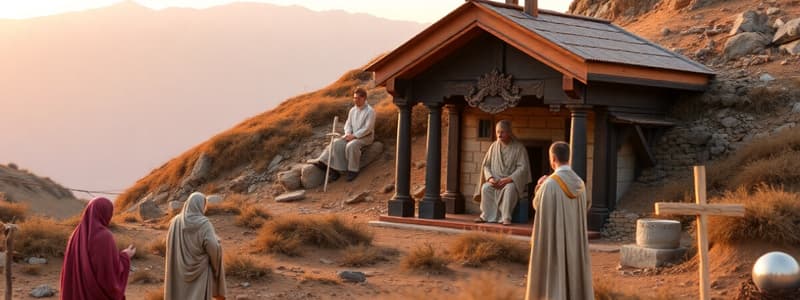Podcast
Questions and Answers
According to Erich Fromm, religion is an expression of our basic human needs, suggesting it is an ______ aspect of all cultures.
According to Erich Fromm, religion is an expression of our basic human needs, suggesting it is an ______ aspect of all cultures.
inevitable
Humans, as journeying beings or homo ______, consistently seek something greater than themselves, often leading to the concept of a creator or God.
Humans, as journeying beings or homo ______, consistently seek something greater than themselves, often leading to the concept of a creator or God.
viator
The constant human pursuit of religion can be seen as a search for answers to our ______ and spiritual burdens.
The constant human pursuit of religion can be seen as a search for answers to our ______ and spiritual burdens.
existential
The notion of “religious experience” invites us to perceive everyday life as a ______ of something greater than ourselves.
The notion of “religious experience” invites us to perceive everyday life as a ______ of something greater than ourselves.
Religion provides a system of ______ that guides individuals on what to live and die for.
Religion provides a system of ______ that guides individuals on what to live and die for.
According to Immanuel Kant, religion is the recognition of all our duties as ______ commands.
According to Immanuel Kant, religion is the recognition of all our duties as ______ commands.
The most commonly accepted etymology of the word “religion” is the Latin term religare, which means to ______.
The most commonly accepted etymology of the word “religion” is the Latin term religare, which means to ______.
Cicero proposed the Latin term relegere as the etymological root of religion, which roughly means “to read or go through again in ______ or thought”.
Cicero proposed the Latin term relegere as the etymological root of religion, which roughly means “to read or go through again in ______ or thought”.
According to Karl Marx, religion is the '______ of the masses'.
According to Karl Marx, religion is the '______ of the masses'.
In every religion is an element of ______, and a vision of searching for the deepest values of humanity that can only be found through an authentic connection with the destination, the Supreme Being – God.
In every religion is an element of ______, and a vision of searching for the deepest values of humanity that can only be found through an authentic connection with the destination, the Supreme Being – God.
Flashcards
Religion
Religion
A tool used to answer existential questions about life and existence, providing a system of orientation.
Religion as a Human Need
Religion as a Human Need
The idea that religion is a basic human need and that all cultures will always have it.
Religious Experience
Religious Experience
The daily experience of God in ordinary life, seeing everything as manifestations of something greater.
Daily Religious Experience
Daily Religious Experience
Signup and view all the flashcards
Spirituality
Spirituality
Signup and view all the flashcards
Religion's Influence
Religion's Influence
Signup and view all the flashcards
Transcendence in Religion
Transcendence in Religion
Signup and view all the flashcards
Religion: 'To Bind'
Religion: 'To Bind'
Signup and view all the flashcards
Kant's View of Religion
Kant's View of Religion
Signup and view all the flashcards
Durkheim's Definition of Religion
Durkheim's Definition of Religion
Signup and view all the flashcards
Study Notes
- Religion is a vital part of human life, and it is used to answer questions about life and existence.
- From the beginning of civilization, it has been a vital component of the human condition, providing a system of orientation for how to live or die.
- The pursuit of religion is a search for answers to both existential and spiritual burdens.
- Religion functions as an anchor at the core of humanity's existence, providing meaning and sense.
- Humans, or 'homo viator', seek something greater than themselves.
- Logical thinking leads to a concept of a maker, often identified as God.
- Thousands of years of civilization has established countless religions.
- Philosopher Erich Fromm argued religion is an inevitable expression of basic human needs found in all cultures.
- Religion has affected present lives, both good and bad.
- In the Western narrative, religion became the defining factor of truth.
- A "religious experience" can be a day-to-day interaction with God in ordinary life, seeing everything as manifestations of something greater than ourselves.
- The goal is to experience God on a daily basis; even interactions with God in ordinary things should never be discounted.
- Spirituality is not treated in a monastic sense, but in the simple way of life of the ordinary believer.
- Religions, religious experience, and spirituality must be understood with care, and a single misstep can have negative repercussions.
- Religion, when properly understood, can transform the believer and move society forward.
- Every religion contains transcendence and a search for the deepest values of humanity through connection with the Supreme Being, God.
Religion
- There's much controversy and debate around the etymology of the word "religion".
- Cicero proposed the Latin term relegere, meaning "to read or go through again in speech or thought".
- The most accepted etymology is the Latin religare, meaning "to bind".
- Cicero and early etymologists saw religion as a system that binds individuals to social, moral, and legal duties or contracts.
- Definitions provide only the nominal meaning, but aren't capable of giving a full and real understanding of the concept.
- Numerous scholars, philosophers, sociologists, and theologians have attempted to define religion.
- Immanuel Kant said that “religion is the recognition of all our duties as divine commands," with religion never separate from ethics.
- Emile Durkheim defined religion as “a set of ceremonial actions, assembling the group, heightening its emotion, and focusing its member on symbols of their common belongingness.”
- Karl Marx stated that religion is the “opium of the masses.”
Fundamental Features of Religion
Cosmological Dimension
- Religion is an avenue to answer big questions about existence.
- It provides explanations about faith, the universe, creation, nature, meaning, the form of the universe, and and the place of humanity.
- It tries to put meaning into the world.
- Religion achieves this through myths, theories, and visions of the creation, nature, meaning, and forms of the universe.
Soteriological Dimension
- Religion provides a scheme for salvation.
- Most religions have a soteriological or salvific dimension.
- Soteriological dimension attempt to give an answer to the question "What happens after death?".
- This dimension also answers how to ensure a good destination when one dies.
- Examples include heave and hell for Christians, samsara and moksha for Hindus, and nirvana for Buddhists.
Anthropological Dimension
- Religion teaches us to live together properly, and that there's more than mundane world.
- It encourages us to seek beyond finite human experience and aspire for what is greater than our minds can comprehend.
Symbolic Dimension
- Religions use symbols and rituals.
- Symbols are signs used for sacred objects or ideas and are used to add meaning to human behavior.
- Religious rituals are prescribed, repeated behaviors with specific outcomes that enrich religion and the person.
- Symbols and rituals help establish traditions and transform religious traditions via symbols like the cross for Christians, "om" for Hindus, and male circumcision of Jews.
Moral Dimension
- Every religion provides a moral compass and a sense that there is a right way to live and act, also known as morality.
- To live a moral life means to live out the precepts of the religion.
- The idea of good and evil effectively provides moral guidance.
- Major religions vary in their definitions of what constitutes a good life, and the line between moral philosophy and religion is anything but clear.
Organizational Dimension
- All religions recognize an authority.
- Religious matters are often settled by religious authorities.
- Most religionsare headed by priests or pastors who undergo years of training and education.
- Other religions emphasize internal authority and personal understanding of how to live in the world.
Theological Dimension
- Religions introduce the existence and nature of a supreme being, which is the defining feature of religion.
- A god is the primary object of all religious practice and devotion.
- Understanding a particular religion often involves knowledge and appreciation of the supreme being or beings.
- All forms of religious devotional systems are considered expressions of the divine.
Religious Experience
- The term "religious" may refer to divinity and to something holy or sacred, not the profane.
- "Religious" may also refer to a set of beliefs.
- "Experience" may be defined as something that occurs in life–an event that is often personal or subjective in nature.
- A religious experience could be described as a personal experience that pertains to an encounter of the Sacred understood within a religious framework, or an experience of God.
- William James identified religious experience as transcendental, blocking everything else out.
- Transcendental means something takes us away from our normal physical experience.
- Religious experience connects us to the divine, blocking everything else out, allowing one to focus on their attention and engage fully in that particular experience.
- In society where science and technology have advanced society, encountering something religious is more challenging than in the past.
- Religious experiences are difficult to understand, sometimes impossible to grasp by our limited minds.
- According to Rudolf Otto, religious experience is not readily given to everyone because it is not obvious.
- Consequences, not recognition or cause of a religious experience, are important.
Spirituality
- Spirituality isn't similar to spiritism, or the belief that spirits exist apart from matter.
- Spiritually does not mean the belief that the spirit splits from the body and haunts as ghosts.
- Spirituality is not the same as Spiritualism, or the belief in the survival of the human personality and in communication between the living and the dead, for example, the use of a Ouija board.
- Spirituality is not mesmerism/animal magnetism, an activity that dazes and subordinates the subject to the operator.
- Spirituality is not hypnotism.
- Spirituality is not similar to religiosity, which is concerned with man-made, external, visible religion, traditions, and beliefs.
What is Spirituality?
- Spirituality concerns the problems connected with the spirit or soul.
- The definition presupposes embodied spirits, meaning that we're composed of both body and spirit.
- According to Sawan Ashram, it is the science of developing higher consciousness in Man on the level of the soul, and making one transcend from mere bodily consciousness into cosmic consciousness, so as to enable one to understand the working of the divine plan.
- Spirituality can exist without religion, and people do not have to believe in any religion to pursue spiritual growth.
- Both religiosity and spirituality would be more effective if practiced together.
- Spirituality and religiosity practiced together produce a better outcome.
- Spirituality gives meaning to religiosity, whereas religiosity guides spirituality.
Summary and Conclusion
- Key concepts such as religion, religious experience and spirituality have many definitions.
- It's necessary to keep an open mind in order to understand them properly.
- Studying religion is more technical than it appears, yet these concepts will become clearer as discussion move forward.
Studying That Suits You
Use AI to generate personalized quizzes and flashcards to suit your learning preferences.
Related Documents
Description
Explore the fundamental aspects of religion through the lens of prominent thinkers like Erich Fromm, Immanuel Kant, and Cicero. Understand religion as an expression of human needs, a search for meaning, and a system of obligations. Delve into key etymological roots and varying interpretations of religious experience.




